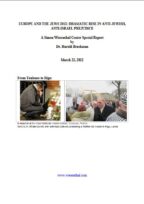Fonte:
www.wiesenthal.com
by Harold Brackman
The year is 2012, but the echoes are of 1933 to 1945:
Not far from the Holocaust Memorial in Toulouse with an inscription reading,
“Where is Your Brother?” – Yonathan Sandler, a teacher from Jerusalem, together
with his two children Aryeh, age 6, and Gavriel, age 3, and 8-year-old Miriam
Monstango, the daughter of the principal of Ozar Hatorah school, are dead, victims of
a moped-driving, masked, black-helmeted assassin, trained by the Taliban and
claiming to belong to Al Qaeda, later identified as Muhammad Merah, who used a
cell phone to film the attack. Merah previously employed the same weapon to gun
down four French soldiers, killing three of North African origin. European Union
High Representative for Foreign Affairs Catherine Ashton linked the murder of
French Jews in Toulouse to “what is happening in Gaza” before repudiating her
remark.
An incommensurate event, yet not insignificant, occurred weeks before, in
Kaiserslautern, Germany, as soccer teams trained for June EURO 2012 in Poland and
Ukraine, the Simon Wiesenthal Center protested to the Union of European Football
Associations (UEFA) the anti-Semitic outburst—including “Seig Heil” salutes, “Heil
Hitler” and chants of “Join the 6 million”—directed at Itay Schechter, the son of
Holocaust Survivors from Romania.
Just days before the Kaiserslautern incident, an exposé by the Jerusalem Post and
protest by the Wiesenthal Center caused the Dutch VPRO media corporation to
remove an anti-Israel, anti-Semitic board game—“Settlers of Catan”—that reflected
the resurgence of classic anti-Semitic stereotypes, shunned in polite society since the
Shoah, back into mainstream vogue.
And at the same time, a Swedish Christian Art exhibition depicted Israelis as guntoting
rats devouring the “Holey [sic] Land.” In its protest, the Wiesenthal Center
commented: “Depicting Jews as animals was perfected by the Nazi propaganda
machine was an effective way to dehumanize Jewish citizens in the eyes of their
German neighbors. The propaganda of the 1930s set the stage for the murder of 6
million Jews in the 1940s. Since then, Soviet and Arab and Muslim anti-Jewish
propaganda used the very same method. Now it has surfaced in 2012 Sweden. It
should come as no surprise that far right extremists should celebrate this art exhibit by
Swedish painters depicting Jews as violent noxious animals, but the real question is
what do Swedes who are not racists think?”
Europe—the historic civilization from which the Jews emerged into modern world through
the crucible of triumph and tragedy—seems to be again approaching, as many prefer to avert
their eyes, the same paroxysm of Jew hatred that plunged the continent into its twentycentury
abyss. Is the twenty-first century doomed to repeat with variations the tragedies of
the twentieth? The answer may depend whether Europe, this time, repeats the cycle of
indifference or instead stands up against evil before it is too late.


